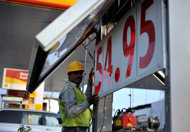Oil prices decline after brief spike

New York's main contract, light sweet crude for delivery in December, fell 65 cents to $98.34 a barrel after reaching a near four-month high of $99.69 earlier in the day.
Brent North Sea crude for December shed $1.10 to $113.06.
Algerian Energy Minister Youcef Yousfi on Monday said that current oil prices were fair for both consumers and producers, and were having "no major (negative) impact on the global economy."
Prices futures have risen in recent days on international tensions over Iran's nuclear ambitions, helping to offset fears that the eurozone debt crisis could slash demand for energy, according to analysts.
Iran is the second-biggest producer in the Organization of Petroleum Exporting Countries after Saudi Arabia, and any escalation in the standoff over its nuclear programme is seen as potentially disruptive to oil supplies.
"We think that the markets are just getting a little concerned over the supply side shock that could come if the matter escalated in some form or extent," said David Lennox, an analyst at Fat Prophets research house.
Israeli Prime Minister Benjamin Netanyahu on Sunday called on world governments to waste no time in stopping "Iran's race to arm itself with a nuclear weapon."
The International Atomic Energy Agency (IAEA) said in a report last week there was "credible" intelligence suggesting Iran had carried out work towards building nuclear warheads, a claim denied by Tehran.
In Europe meanwhile, the focus was on Rome, one day after economist Mario Monti was picked to replace Silvio Berlusconi as Italy's prime minister.
Monti has pledged to get to work on tackling a crippling debt crisis in Italy, which is the eurozone's third-biggest economy.
What the stars mean:
★ Poor ★ ★ Promising ★★★ Good ★★★★ Very good ★★★★★ Exceptional
Latest News
More News
- Cashless payments hit 28 times GDP in 2025 (February 04, 2026 | 18:09)
- SSIAM and DBJ launch Japan Vietnam Capital Fund (February 04, 2026 | 15:57)
- Banks target stronger profits, credit growth in 2026 (February 04, 2026 | 15:43)
- Vietnam on path to investment-grade rating (February 03, 2026 | 13:07)
- Consumer finance sector posts sharp profit growth (February 03, 2026 | 13:05)
- Insurance market building the next chapter of protection (February 02, 2026 | 11:16)
- NAB Innovation Centre underscores Vietnam’s appeal for tech investment (January 30, 2026 | 11:16)
- Vietnam strengthens public debt management with World Bank and IMF (January 30, 2026 | 11:00)
- Corporate bond market poised for stronger growth cycle (January 28, 2026 | 17:13)
- Vietnam's IPO market on recovery trajectory (January 28, 2026 | 17:04)
















 Mobile Version
Mobile Version